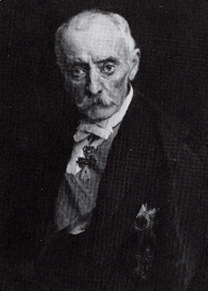Prince Chlodwig zu Hohenlohe-Schillingsfürst
| Chlodwig zu Hohenlohe-Schillingsfürst | |
|---|---|
 |
|
| Chancellor of Germany | |
|
In office 29 October 1894 – 17 October 1900 |
|
| Monarch | Wilhelm II |
| Deputy |
Karl Heinrich von Boetticher Arthur von Posadowsky-Wehner |
| Preceded by | Leo von Caprivi |
| Succeeded by | Bernhard von Bülow |
| Prime Minister of Prussia | |
|
In office 29 October 1894 – 17 October 1900 |
|
| Monarch | Wilhelm II |
| Preceded by | Botho zu Eulenburg |
| Succeeded by | Bernhard von Bülow |
| Prime Minister of Bavaria | |
|
In office 31 December 1866 – 8 March 1870 |
|
| Monarch | Ludwig II |
| Preceded by | Ludwig von der Pfordten |
| Succeeded by | Otto von Bray-Steinburg |
| Personal details | |
| Born |
Chlodwig Carl Viktor 31 March 1819 Rotenburg an der Fulda, Hesse (Now Germany) |
| Died | 6 July 1901 (aged 82) Bad Ragaz, Switzerland |
| Political party | Independent |
| Religion | Roman Catholic |
| Signature | |
Chlodwig Carl Viktor, Prince of Hohenlohe-Schillingsfürst, Prince of Ratibor and Corvey (German: Fürst zu Hohenlohe-Schillingsfürst, Fürst von Ratibor und Corvey) (31 March 1819 – 6 July 1901), usually referred to as the Prince of Hohenlohe, was a German statesman, who served as Chancellor of Germany and Prime Minister of Prussia from 1894 to 1900. Prior to his appointment as Chancellor, he had served in a number of other positions, including as Prime Minister of Bavaria (1866–1870), German Ambassador to Paris (1873–1880), Foreign Secretary (1880) and Imperial Lieutenant of Alsace-Lorraine (1885–1894). He was regarded as one of the most prominent liberal politicians of his time in Germany.
Chlodwig was born at Rotenburg an der Fulda, in Hesse, a member of the princely House of Hohenlohe. His father, Prince Franz Joseph (1787–1841), was a Catholic; his mother, Princess Konstanze of Hohenlohe-Langenburg, a Lutheran. In accordance with the compromise customary at the time, Chlodwig and his brothers were brought up in the religion of their father, while his sisters followed that of their mother.
As the younger son of a cadet line of his house it was necessary for Chlodwig to follow a profession. For a while he thought of obtaining a commission in the British army through the influence of his aunt, Princess Feodora of Hohenlohe-Langenburg, half-sister to Queen Victoria. Instead, however, he decided to enter the Prussian diplomatic service.
...
Wikipedia
